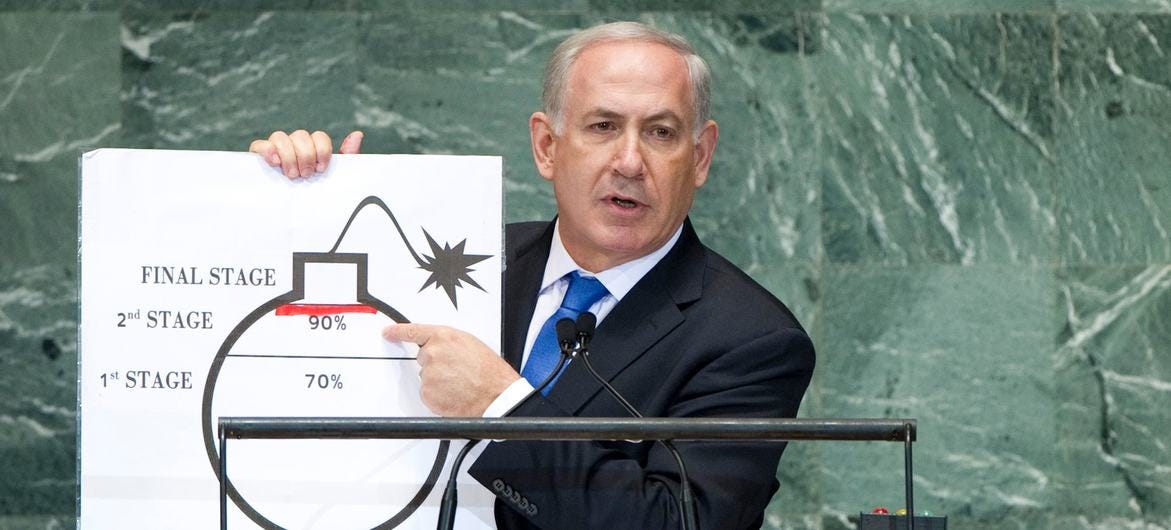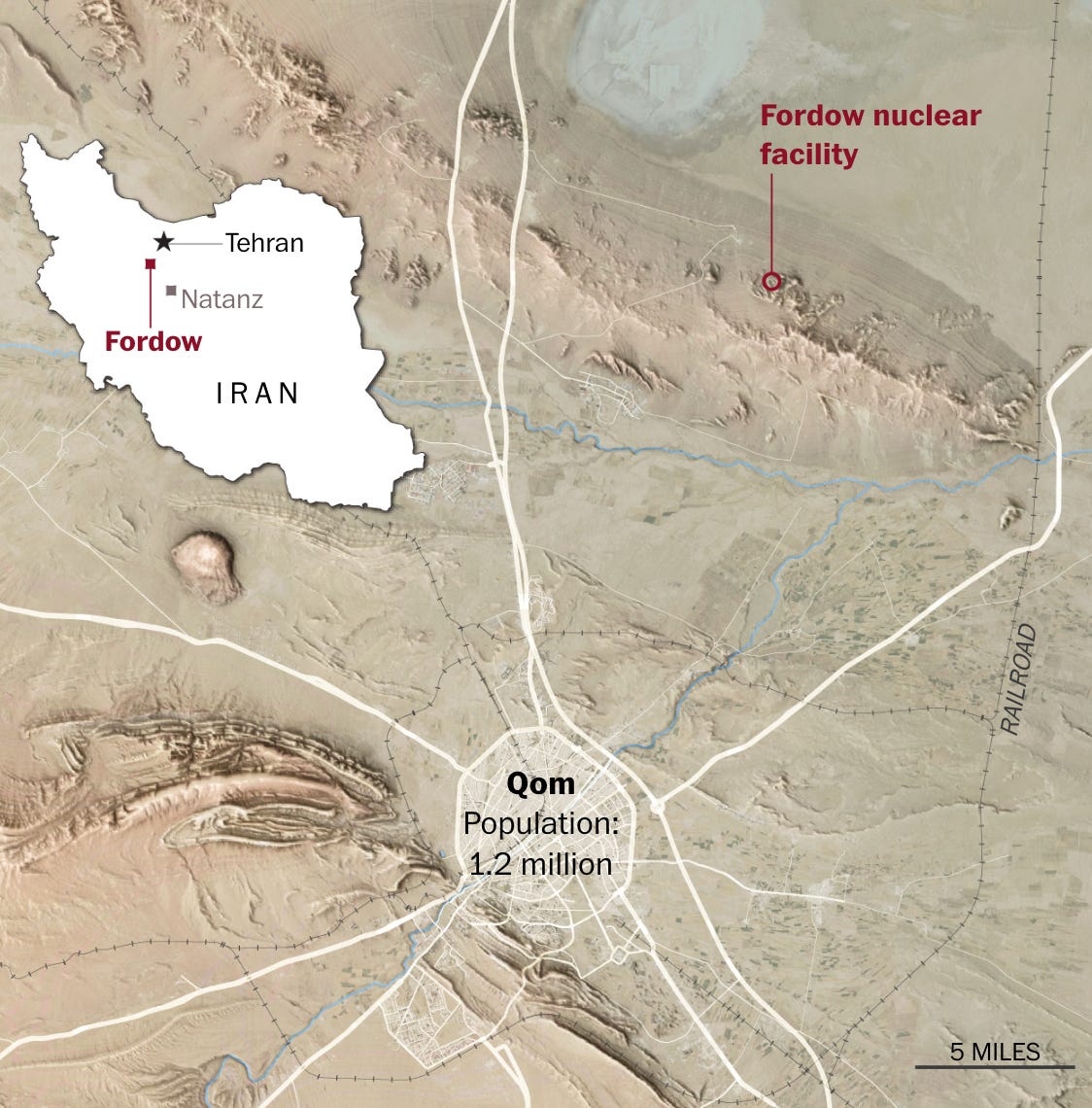Donald Trump is currently mulling over one of the most fateful decisions of his second term: whether or not the US should link-up with Israel and attack Iran.
Over the next two posts, we will take a look at the current situation, the potential impact, and alternatives to American military force.
Why did Israel choose to attack Iran now?
Israeli claims that Iran is close to a nuclear bomb
Last week, Netanyahu claimed Israel uncovered new intelligence of an “imminent” Iranian threat, that Iran was close to developing a nuclear weapon. In his view, Israel had to make a “preemptive” strike, or else face potential annihilation. According to intelligence materials provided to the US by Mossad, Israel’s intelligence agency, Iran has enough material to build a nuclear weapon in 15 days.
Since launching its assault last week, Israel has been remarkably effective targeting Iranian nuclear scientists, intelligence and military personnel1. Israel has also damaged several Iranian nuclear facilities. While the US has not launched any formal assaults against Iran, it has supported Israel by shooting down Iranian missiles.
A weak and isolated Iran
To Israeli prime minister Benjamin Netanyahu, now is the perfect time to strike an Iran that is weaker and more cut-off from its allies and proxies than ever.
Following the attacks of October 7, Israel has taken out much of Iran’s regional proxy network, with both Hamas and Hezbollah currently shells of their former selves. The Houthis and militias in Iraq are still operating, but they are more contained.
Bashar al-Assad, Iran’s key regional ally, has been toppled within Syria.
Russia, another of Iran’s allies, is MIA dealing with its own incursion into Ukraine.
This has given Israel an essentially unimpeded path, or as unimpeded as possible considering the two rivals don’t share a land border and are conducting an entirely aerial battle.
Diverting attention from Gaza
As the world watches Israel and Iran trade blows, this is serving as a welcome distraction for Netanyahu as the situation in Gaza continues to spiral. To cite but one recent report, on June 18, 140 people were killed across Gaza over the course of 24 hours, including nearly 60 Gazans simply trying to get food from aid trucks.
But is Iran actually close to obtaining a nuclear weapon?
Right now, it really depends who you ask.
Let’s start with the basic fact that you have to take Netanyahu’s word with a heavy grain of salt. According to the director for non-proliferation policy at the Arms Control Association, Netanyahu has not presented “any clear or compelling evidence that Iran was on the brink of weaponizing.” But this is usual course of business for the Israeli prime minister, who has consistently advocated for the US to exert its strength in the region. This includes 2002, when he advised Congress to seek regime change in Iraq and guaranteed that taking out Saddam Hussein would have “enormous positive reverberations on the region” including in Iran.
In a 2012 speech at the UN, Netanyahu declared Iran was perilously close to having enough enriched uranium to create a nuclear weapon, which, thirteen years later, has yet to materialize.
Netanyahu has consistently been ‘the boy who cried wolf’ when it comes to Iran’s nuclear arms.

The IAEA: An International Atomic Energy Agency (IAEA) report published at the end of May warned that Iran had stockpiled more enriched uranium than previously suspected, calling it a “matter of serious concern.” However earlier this week, the director of the IAEA told CNN that “we did not have any proof of a systematic effort to move into a nuclear weapon,” with the caveat that there is always the risk nuclear material is stored in secret locations..
The United States: In March, the Director of National Intelligence Tulsi Gabbard testified that Iran, while it possessed a formidable stockpile of enriched uranium, was not building a nuclear weapon. However, Gabbard’s conclusion was muddled earlier this month by Erik Kurilla, leader of US Central Command, when he told the Senate that Iran was “continuing to progress towards a nuclear weapons” regime and that it possessed a sufficient stockpile of highly enriched uranium that could produce a nuclear weapon in a few weeks. Then, when asked about it earlier this week, Trump publicly refuted Gabbard’s claim, saying “I don’t care what she said. I think [Iran is] very close to having one.”
But on Thursday (June 19), the Times reported that the US intelligence community’s position had not changed since Gabbard’s March testimony: Iran still had not yet decided to make a nuclear bomb.
It goes without saying that how close Iran is to actually developing a nuclear weapon is critically important to deciding whether or not the US should engage. The lack of a united public front from the Trump administration is not a great sign and does not engender much confidence.
While the actual intelligence and conversation seems a bit all over the place, it seems like two things can be true:
That Iran possesses a stockpile of enriched uranium, but
Has not started building a nuclear weapon.
This is important because if Iran is not close to a nuclear weapon, then Netanyahu and Israel had no legitimate reason to initiate this attack in the first place.
And if Iran is not close to having a nuclear weapon, the US really does not need to get involved right now.
Why does Israel want the US to get involved?
Because one of Iran’s most important nuclear facilities, the Fordow nuclear enrichment facility, is out of the reach of Israel’s current military kit.
Only the United States possesses the combination of bomber jets and 30,000-pound ‘bunker buster’ bombs necessary to hit the heavily-fortified Fordow. However, with some observers claiming the most sensitive facilities are located as much as half a mile beneath the surface, there is debate over how much damage the these US-carried bombs could inflict, not to mention that it would be impossible to immediately verify if the facilities were destroyed.
Another important note: these ‘bunker busters’ have never been deployed in active combat.
Fordow is located in the desert, southeast of Tehran. The facility is buried deep underground, carved into the mountainside.

On Thursday (June 19) Netanyahu gave an interview with a domestic Israeli television station in which he said Israel was capable of taking out all of Iran’s nuclear facilities, including Fordow, without US support. Is he simply posturing for his domestic audience, or is he serious that Israel could eliminate Iran’s nuclear capabilities without the US, in which case, why should the US risk broader conflict by getting involved?
Is Israel’s attack (and by extension, potential US involvement) legal?
International law
Unsurprisingly, legal experts are split on the matter.
In one corner, a purely preemptive strike by Israel to prevent a potential future strike by Iran would likely be illegal, unless it could be proved that an Iranian attack were imminent.
On the other side, Israel might argue its strike is part of defensive countermeasures targeted at Iranian proxies since October 7th, which could be legal, if deemed necessary and proportional.
I know in the year 2025 the legality of government actions has basically been torn asunder, but it is still important to consider whether or not Israel breached international law when it bombed Iran last week (and by extension, whether the US as an Israeli ally would be in compliance with international law). Just think how, twenty years later, public opinion largely views America’s decision to invade Iraq in 2003 as illegal. It may not matter much, but to the rest of the world, an unjustified attack sets a dangerous precedent (not that bad actors like Putin necessarily need an excuse to go after his enemies).
If the US decides to attack Iran under fuzzy rationale, could China, who already engages in whataboutism regarding America’s role in the world, claiming America says one thing but does another (do as I say, not as I do), use this as pretext to invade Taiwan in the future?
Wither Congress?
Under the Constitution it is Congress not the President that has the power to declare war. And not since World War II has Congress formally declared war.
Of course, we all know that doesn’t mean the US hasn’t engaged in global conflicts.
In the days after 9/11, Congress passed an Authorization for Use of Military Force which gave Bush the authority to invade Afghanistan. A follow-up AUMF was passed in 2002 authorizing the invasion of Iraq. In the twenty odd years since, each administration (Bush, Obama, Trump and Biden) has relied on this law to conduct assorted military operations across at least 22 countries.
But just because it was used previously doesn’t justify its continued use. It’s fairly straightforward: Congress needs to have a say.
“[Trump] absolutely needs congressional authorization if he intends to use military force against Iran,” said Oona Hathaway, a former Pentagon lawyer and professor at Yale Law School. “That clearly would not fall within either of the existing A.U.M.F.s.”
Right now it appears members in both the House and Senate are aware, as each is trying to enact legislation that would require Trump get Congressional approval before launching a strike. Whether or nor they can work together to pass such legislation (and whether Trump would adhere to any restrictions) though, is certainly debatable.
************************
Tomorrow, we will return with an assessment of the ramifications of American action or inaction in Iran.
All of which begs the question: If you are so effective at intelligence and direct killings, why the need for the indiscriminate civilian bombing campaign in Gaza?



